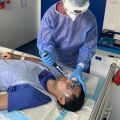Paediatric Neuroimaging Group launches animation series to support parents of premature infants
27 February 2024
Professor Caroline Hartley, Principal Investigator, and Dr Marianne van der Vaart, Postdoctoral Researcher, in the Paediatric Neuroimaging Group at the Department of Paediatrics, have today launched a series of animations aimed at improving parental understanding of brain development in premature infants, and the effect it has on breathing and apnoeas (the cessation of breathing).
The series, called My Baby’s Brain, has been developed to support parents of premature babies, enabling them to understand why premature babies have apnoeas, the treatment they receive, and the equipment that is used.
My Baby’s Brain is a free, online resource that was created in collaboration with parents of premature babies alongside SSNAP (Supporting sick newborn and their parents), a charity based in the Newborn Care Unit at the John Radcliffe Hospital in Oxford.
Lauren Young, mother to Georgie, (age 7 and born at 40 weeks) and to Rosie (age 3 and born at 24 weeks), and also part of the Family Care Team at SSNAP, was part of the parent group that led to the creation of the series. She had a “traumatic, exhausting and long hospital stay of nearly 6 months” following the birth of her youngest daughter, and proactively wanted to help neonatal research and development. She said: “In my role with the Family Care Team for SSNAP I see so many parents trying to navigate all the information they receive from the medical teams. I feel strongly that anything helping parents to process the information, feel more comfortable with their surroundings and the care that their child is receiving, can go a really long way to helping them on the journey.”
“These animations will be so helpful to parents and families with premature babies. They will help them to understand the reasons their baby is needing the care they receive and give a very clear picture of equipment used, as well as a soft introduction to language and terminology they may hear along their journey. My Baby’s Brain will help parents feel more in touch with their babies’ care and help them to build confidence in the neonatal setting.”
Professor Hartley said: “In the UK, 1 in 13 babies is born prematurely. Apnoea of prematurity is a common problem in neonatal care, affecting around 50 percent of premature infants. Apnoeas are well-managed by the clinical team but can be worrying for parents. These animations have been put together with parents in mind, to give parents of premature babies a better understanding of how their baby’s brain is developing, how apnoea is linked to the immaturity of a premature infant’s brain, and the techniques researchers use to investigate brain development. Working together so closely with SSNAP and parents on this project has been extremely rewarding and enjoyable and has greatly enriched the animations which we hope will be a valuable resource for parents.”
Martin Realey, Charity Lead for SSNAP, said: “We are delighted to be able to support the creation of My Baby’s Brain which will be an indispensable tool to all parents to premature infants on neonatal units here in the John Radcliffe Hospital, and across the country. They have been made with parents in mind to ensure the information is accessible and easy-to-understand. The videos can be accessed using QR codes making them available on mobile devices, allowing parents to choose a time that best suits them to watch and process the information: This could be cotside with their baby, in the Department of Paediatrics, University of Oxford Press Release 27th February 2024
quiet of their home, or even sharing them with other family members. Viewers are also able to choose from bite-sized clips or longer videos which helps manage what can be an exhausting time of processing so much new information.”
My Baby’s Brain was funded by the Wellcome Trust Enriching Engagement programme, an initiative created to support researchers’ public engagement outreach. This series is the public engagement activity of Professor Hartley’s core research project into the relationship between apnoeas and brain development in premature infants.
Professor Hartley is a Sir Henry Dale Fellow at the Department of Paediatrics.
Notes to editors:
The series is available at:
My Baby's Brain — Paediatric Neuroimaging (ox.ac.uk)
Neuroimaging Group – YouTube
For further information and any questions please contact Laura Borg at [email protected]
About the Paediatric Neuroimaging Group
The Paediatric Neuroimaging Group was established in 2013 and brings together scientists, clinicians, and engineers to further our understanding of early human brain development. The group is a unique research environment integrating a major children's hospital with advanced medical imaging, clinical trials, neuroscience and ethics expertise. Its research focuses on a better understanding the development and treatment of infant pain, and understanding the impact of apnoea on the developing brain.
About the Department of Paediatrics
The Department of Paediatrics at the University of Oxford is a global leader in the research, delivery and advancement of the health and care of children and adolescents. It hosts internationally renowned programmes in drug development, gastroenterology, haematology, HIV, immunology, neuroimaging, neuromuscular diseases and vaccinology to name a few, and its work spans from early proof-of-concept and fundamental science to its application in clinical settings.
The Department of Paediatric’s pioneering research, policy development and clinical excellence is led by world-class experts in their field and it has a long track record of success in the development and delivery of effective treatments and interventions. Its work is supported by the clinical and educational resources of one of the world’s foremost academic institutions.
About SSNAP
SSNAP supports sick & premature babies and their families in the Newborn Care Unit at the John Radcliffe Hospital, Oxford. This is done by providing emotional, medical, financial and informational support. Department of Paediatrics, University of Oxford Press Release 27th February 2024
Imagine your newborn baby needing specialist care at birth. Instead of those very special days getting to know your baby as a family, you’re catapulted into an unfamiliar world of incubators, wires, medical tests and interventions.
While your baby has specialist treatment, we provide emotional and practical support to help you through the trauma & upheaval. We’re there to help families cope, and provide state-of-the-art medical equipment and nursing expertise that could save babies lives.
About the University of Oxford
Oxford University has been placed number 1 in the Times Higher Education World University Rankings for the eighth year running, and number 3 in the QS World Rankings 2024. At the heart of this success are the twin-pillars of our ground-breaking research and innovation and our distinctive educational offer.
Oxford is world-famous for research and teaching excellence and home to some of the most talented people from across the globe. Our work helps the lives of millions, solving real-world problems through a huge network of partnerships and collaborations. The breadth and interdisciplinary nature of our research alongside our personalised approach to teaching sparks imaginative and inventive insights and solutions.
Through its research commercialisation arm, Oxford University Innovation, Oxford is the highest university patent filer in the UK and is ranked first in the UK for university spinouts, having created more than 300 new companies since 1988. Over a third of these companies have been created in the last five years. The university is a catalyst for prosperity in Oxfordshire and the United Kingdom, contributing £15.7 billion to the UK economy in 2018/19, and supports more than 28,000 full time jobs.
 New algorithm supercharges climate models and could lead to better predictions of future climate change
New algorithm supercharges climate models and could lead to better predictions of future climate change
 New study to improve vaccines and therapeutics development
New study to improve vaccines and therapeutics development
 Dr Ashwin Jainarayanan selected for 2024 Schmidt Science Fellow program
Dr Ashwin Jainarayanan selected for 2024 Schmidt Science Fellow program
 Nature degradation could cause a 12% loss to UK GDP
Nature degradation could cause a 12% loss to UK GDP
 Alok Sharma to join the Oxford Martin School as a Visiting Fellow
Alok Sharma to join the Oxford Martin School as a Visiting Fellow